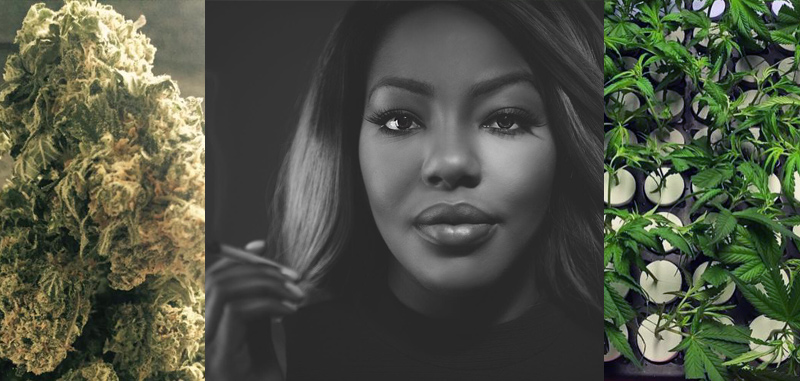
Charlo has also been a proponent of increasing diversity in the legal cannabis industry, which, although it has received attention for the significant number of women entrepreneurs who have populated the space, has primarily been made up of white people. To help promote a more inclusive and representative industry, she recently founded GoGREENE.org, a non-profit intended to encourage diversity via education, networking, and empowerment.
“To be a true activist you have to know the cause you’re fighting for and its history. All real cannabis activists know our drug policy is racist as fuck.”
We recently had the opportunity to ask Charlo about her rise to cannabis industry stardom, her take on the lack of racial diversity among cannabis business owners, and what GoGREENE.org is all about. Read the full interview below!
Read the Full Interview:
Ganjapreneur: Normally we ask our guests how they decided to leave their previous careers to pursue opportunities in the cannabis industry, but everyone already knows this about you. Since that day, how have those four words, and your decision to pursue a cannabis career full-time, changed your life?
Charlo: My life is now completely consumed by cannabis and I couldn’t be happier. Every day that I wake, I know I’m now truly serving the greater good – by operating the Alaska Cannabis Club, the state’s first and only legal safe access point for thousands of medical marijuana patients, and through my advocacy work where I share my own truth, knowledge and experience to educate and empower everyday citizens to become champions of the movement for their communities.
How much of an impact do you think your story has had on the legalization movement in Alaska and nationwide?
Without “Fuck it, I quit” Alaska would not have legalized recreational marijuana usage this past November. The vote passed by a very slim margin, 53%-47%, and awareness made all of the difference, which is what my on-air resignation provided with more than a billion impressions world-wide.
As someone who comes from a media background, how important would you say publicity is for a cannabis start-up?
Publicity for a cannabis startup that doesn’t touch the plant directly is important, especially when you’re entering a saturated market, because opening the lines of communication with media and gaining traction will position you as an industry leader. But publicity isn’t necessary and many entrepreneurs I know say it’s led to them becoming targets for law enforcement and the IRS.
When launching the Alaska Cannabis Club, we avoided the media like the plague because I was one of them and knew it would lead to the discovery that I ran the club. But we discovered that when you’re offering a service that people NEED, they will find you. Now that our organization is in the spotlight we’ve be the subject of 2 SWAT raids on my home and business, we were put under an 8 month investigation for alleged campaign finance fraud and have had vehicles and personal property seized – all of this AFTER we voted to legalize recreational marijuana in Alaska.
Be aware that publicity in the cannabis space is almost always a double edged sword.
As we have seen in Washington and elsewhere, some states that legalize will opt to create separate markets for medical and recreational cannabis (for better or worse). How do you think ganjapreneurs in the medical and recreational industries can best work together to ensure a positive future for the industry as a whole?
It’s up to members of the recreational industry to join the fight to uphold medical marijuana, otherwise it’ll be stamped out by politicians, special interests and “activists” who weren’t around for the fight to end prohibition but are now that they see dollars and cents.
Do you see the division of medical and recreational cannabis as a temporary phenomenon? What do you think the cannabis industry landscape will look like in 10 years?
I do believe the division of medical and recreational cannabis is a temporary phenomenon, that’ll only remain until states figure out a way to shut low/no-tax medical marijuana programs down completely once recreational sales are introduced. It’s unfortunate considereing it’s often medical marijuana patients who fight hardest for legalization, but the proof is right there as we witness what’s happening with the medical program in Washington State, which has suffered tremendously since the passage of I-502. Also, here in Alaska, immediately after voters legalized recreational use, the Marijuana Control Board stated they wouldn’t even consider developing both a medical marijuana system and a recreational marijuana system because it would simply be too much work. I think the only way we’ll continue seeing medical marijuana programs that offer patients medicine at a fraction of the retail rate after ushering in recreational marijuana sales is if we ensure language is included in any legislation we pass that protects these systems and follow up by fighting for their continued existence.
The enforcement of cannabis prohibition in the US has statistically been harshest on people of color, particularly on black Americans. Do you believe that this has influenced the decision-making of people of color who might want to get involved in cannabis advocacy, or to start businesses in the legal industry?
Getting into the cannabis space is a scary thing for anyone, but especially for people of color who feel the have and always will remain the first target for law enforcement when this plant is anywhere near. It’s unfortunate because our generation will never have a greater opportunity than what the cannabis space is now offering to undo the harm that marijuana prohibition has wreaked on communities of color financially for decades.
Right now, there is no boys’ club, there is no set all-white male minority leading the industry. Not yet at least. And we can stop that from happening (like it has in every other industry) if we, as people of color, stand up and carve out a space in this billion dollar industry that rightfully belongs to all of us.
What advice would you give to a skilled grower who is a person of color, and who wants to transition into the legal industry?
I’d encourage them to take this once in a lifetime opportunity to build a legal empire, but not to do so lightly. Working in the legal cannabis space comes with a lot of oversight and scrutiny that most underground cultivators wouldn’t be okay with, but if they can withstand the pressure and stay two steps ahead when it comes to regulations, they should be well on their way to cashing in on the green rush.
Many legalization models have sought to exclude people with prior drug convictions from getting involved in the industry. Considering the history of how drug convictions have played out along racial and cultural lines, what effect has this had on the diversity of the legal industry?
I don’t know what effect the exclusion of people with prior drug convictions has had on the glaring lack of diversity in the industry, but I’m willing to bet that that provision, along with the ballooning licensing costs and fees accounted with entering the space contributes to the fact that I’m usually just one of maybe two black people at every cannabis industry event I’ve attended.
In your experience, has the cannabis activist community been welcoming toward people of color? Does the activist community adequately address the intersection of US drug policy and racial issues?
Of course the cannabis activist community has been welcoming toward people of color. This community is comprised of some of the most understanding, empathetic and compassionate people I’ve ever met. To be a true activist you have to know the cause you’re fighting for and its history. All real cannabis activists know our drug policy is racist as fuck. But many in the cannabis community as a whole get uncomfortable when the two – racism and the drug war – are linked. I can’t tell you the number of comments I get from members of the cannabis community claiming I’m trying to start a race war or that I hate white people when I try to educate people about the root of prohibition. This is disheartening because how can we expect to get past prohibition if people ON OUR OWN SIDE can’t or just won’t acknowledge what’s driving these illogical and immoral drug laws today?
That’s why I’m focusing all of my energy on Go GREENE, my nonprofit organization aimed at increasing diversity in cannabis advocacy and industry to help rebuild the communities harmed most by prohibition. We’re working to activate communities of color as we march toward the end of prohibition and to arm everyday citizens from all walks of life with the education and community backing they need to champion the movement in their areas.
What are some proactive steps that cannabis industry businesses can take to make sure they are being inclusive and promoting diversity in their hiring practices?
The most proactive step cannabusinesses can make to ensure they’re being inclusive and promoting diversity is by becoming a sponsor of Go GREENE where we aim to educate, empower and involve communities of color in cannabis activism and industry.
GoGreene.org’s stated mission is to “cultivate diversity in cannabis advocacy and industry” through events that promote “education, networking, and empowerment.” Can you go into some detail about types of things a cannabis entrepreneur will learn at a Go GREENE event?
That depends if the entrepreneur is in an area of pre- or post-legalization. Every meeting starts with current events and updates on any changes in marijuana policy locally. We encourage organizers to find guest speakers that can lead a 20 minute discussion of their area of expertise with Q&A to follow.
Go GREENE Groups in areas that have yet to legalize should have guest speakers that can speak on the benefits of cannabis and harms of prohibition. Suggestions:
- Representatives from fellow cannabis advocacy groups
- Medical marijuana patients
- Cannabusiness leaders
- Healthcare Professionals: doctors, naturopaths, psychologists (be careful not to select a doctor that isn’t willing to admit the benefits of cannabis when used as medicine)
- Botanists (to speak on cannabis cultivation)
- Local media personalities/journalists (for tips on getting your message heard in your community)
- Motivational speakers
- Religious/spiritual leaders – Check this out with the group before hand as this may be an extremely touchy subject for some members
- Criminal defense attorneys
- Local advocates
Go GREENE Groups in areas that have legalized cannabis should have guest speakers that can offer industry insight and help members build businesses. Suggestions:
- Cannabusiness leaders
- Investors
- Tax professionals
- Business attorneys
- Cannabis consultants
- Trade group representatives
- Packaging companies
- Seed to sale companies
- Botanists (to speak on cannabis cultivation)
- Local politicians
Can you elaborate a bit on what a Go GREENE group is, and who can organize one?
Go GREENE Groups are monthly cannabis advocacy and industry networking events – organized by you (like a book club, but instead of books, attendees discuss cannabis related topics). Go GREENE Groups are all about G.rass R.oots E.volution through E.ducation, N.etworking and E.mpowerment.
These peer-to-peer groups allow everyday citizens to become the catalyst for change in their own communities by unifying local activists to have greater impact, connecting members to invaluable resources and providing a international support group of cannabis advocacy and industry leaders. Starting a Go GREENE Group is easy and organizing at least one meeting a month should only take a few hours!
Anyone can start a Go GREENE Group: head to http://GoGreene.org for more info.
Thank you for sharing your experience and insights with us, Charlo! We look forward to seeing the impact that Go GREENE groups will have empowering communities and increasing access to opportunities in the legal industry.
